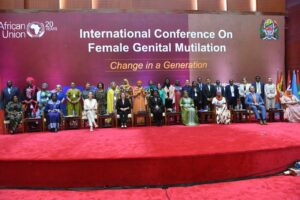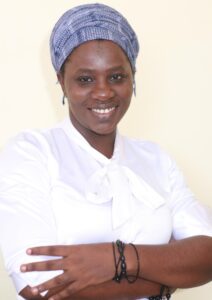In August 2023, four women were found guilty of performing Female Genital Mutilation by a Kuntaur Magistrate court in the Central River Region (CRR) near Gambia’s capital, Banjul. According to The Gambia Committee on Traditional Practices Affecting the Health of Women and Children(Gamcoptrap), a feminist and gender activist movement that has championed the cause of FGM since 1984, the children were between 4 months and one year old. The existing law passed in 2015 bans Female Genital Mutilation (FGM) and calls for a sentence of three years or a fine of fifty thousand or both. The four women were fined GMD15000 each ($230) or spend a year in prison.
There were a lot of mixed reactions to their sentence; the fine was less than expected, but it gave me hope that, finally, something had been done. Such stringent upholding of the law could spare a lot of girls the trauma of mutilation. Records show that 76% of Gambian women are survivors of FGM.
What followed was a debate among citizens, politicians and Islamic scholars. Notably, a former Imam to the exiled ex-president Yahya Jammeh had gathered funds to pay for the women’s fines. He used the case to spread religious propaganda in support of the practice of FGM. This was no surprise as patriarchy, despite the law, continues to find a way and reasons to control women, especially our sexuality. Even though FGM has been banned under the amended Women’s Act of 2015, few known cases have made it to court.
The case gave a sense the judiciary was starting to listen and protect our girls, an area that is still ineffective. But the reaction shows that we are not yet done as a society using Islam as a tool to socialise many Gambians into believing FGM is religious instead of a culture that needs to be stopped.
Following the debates, the Gambia National Assembly jumped onto the case, with one Member of Parliament advocating for a repeal of the law that banned FGM. For days, the assembly debated. The MPs backed a proposal to do away with the law followed by the Supreme Islamic Council that has since issued a fatwa condemning anyone who denounces the practice and calling for the government to reconsider the legislation.
Most MPs supported repealing the anti-FGM law, which broke my heart. Like all countries, Gambia faces various challenges from security, economy, high cost of living, and corruption in the government, but women’s and girls’ bodies are being put at the centre stage of harmful debate.
After all the evidence and some three decades of work by feminists and advocates, all are threatened to head down the drain. Gambian girls’ and women’s dignity and privacy were being debated without their voices and in a manner that silences their experiences.
The Ministry of Gender and Social Welfare had since been quiet. With all the atrocities committed against girls and women in this country never seems to make this ministry move and act. Putting the issue of FGM at the heart of politics is not new in the Gambia. Politicians have now and again put harming women and invading their bodies in the political arena as they seek votes.
FGM is detrimental to women’s health, from trauma to childbirth complications and even other lifelong consequences that lead women to become outcasts in their communities.

Despite the evidence, it is even worrying that some medical personnel in The Gambia have loudly been supporting FGM. The African Commission on Human and Peoples’ Rights, which sits in Banjul, and the African Committee of Experts on the Rights and Welfare of the Child have expressed concern on this debate.
They called on the government to:
“safeguard girls and women from the harmful practice of FGM… urged to prohibit, through legislative measures backed by sanctions, all forms of FGM and eliminate harmful social and cultural practices affecting the welfare, dignity, normal growth, and development of the child, as enshrined in Article 5(b) of the Maputo Protocol and Article 21(1) of the African Children’s Charter.”
The Gambia is a signatory to the Convention on the Elimination of All Forms of Discrimination Against Women (CEDAW) and other key international and regional human rights instruments like the Maputo Protocol and continues to claim under the SDGs to ending violence against women as a priority.
We still see a lack of appropriate response from women elected leadership positions in pushing back on this violent rhetoric. I am all for women’s representation but if they don’t have feminist politics, nothing moves, and we regress. Many women leaders have been awfully quiet as the men drive the discussion to remove legal protections against FGM. Many are too ashamed to talk about FGM. If women leaders can’t talk about what’s affecting them, how do we stem the dehumanizing debate and the patriarchy that continues to use women wherever it benefits them?

Since then, civil society organizations, feminists and activists have come together, speaking with one voice, to rally various constituents to end this violence. We must resist and ensure The Gambia maintains the law that puts an end to FGM and protect survivors. There’s no going back; we must protect girls and provide appropriate responses for survivors.
As a survivor, this is a battle I choose to fight.
We will not be silenced, for we know that female genital mutilation is not a religious act and doesn’t serve any purpose in our society except to harm and extend women’s oppression. We might need to go back to the drawing board, meeting with the communities and other stakeholders to ensure no one is cut anymore, and anyone caught will face the full wrath of the law.

Matida Kebbeh is a feminist leader and storyteller from The Gambia. Her expertise is in advocacy and movement building around economic and social justice. Matida volunteers with various young women lead organizations focused on ending child marriage, Female Genital Mutilation (FGM), and other traditional harmful practices, also providing educational support for children from poor backgrounds.
